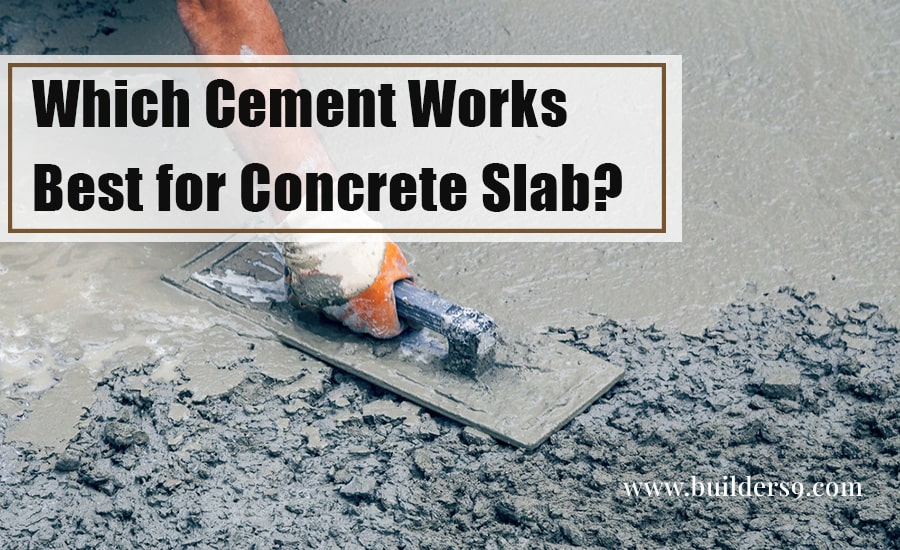Portland Pozzolana Cement (PPC) cement is used to reinforce and strengthen the slab. When PPC cement comes into contact with moisture, it hardens quickly and provides a durable wearing surface.
A concrete slab can be built with PPC cement. Because of its excellent strength-to-weight ratio, it is perfect for use in constructions that require strong but lightweight parts.
Both OPC and PPC cements are suitable for concrete slab building. OPC cement is most commonly used in industrial and commercial construction, while PPC cement is more commonly utilized in modest residential construction.
PPC is utilized where the possibility of sulfate attack is greatest, since it has better sulfate resistance than OPC. Furthermore, pozzolana Portland cement is less expensive than regular Portland cement.
OPC cement hardens faster than PPC cement, has a higher heat of hydration, and so requires more attention during curing.
Cement quality is determined by its composition, which includes the percentages of the bouge compounds, setting time (both initial and final), fineness, specific gravity, and the percentage of mineral admixtures (if any). Every cement property must adhere to the IS code. The date of manufacture is also very essential!
Less curing is necessary (smaller amount of water), but for a longer period of time, at least 14 days.
Yes, it takes time to acquire strength and requires formwork for a longer period of time, but in terms of quality, I believe it is preferable to the OPC.
The creation of C₂S, which is responsible for the increase in strength, is considerably more than the OPC
There are two kinds of cement that are regularly used:
a) Ordinary Portland Cement
b) Portland pozzolana cement.
As a result, the rate of construction is quite rapid.
PPC is utilized in small construction projects. This form of cement is less expensive than OPC and has a longer initial setting time. As a result, both types of cements are preferable for slabs.
Best Quality Cement for Concrete Slab
In all RCC projects where initial and ultimate strength are primary structural requirements, OPC 53 Grade cement is suggested.
Footings, beams, columns, and slabs are examples of RCC structures.
OPC is a typical cement type, whereas PPC is manufactured with a pozzolana substance such as fly ash. PPC is made up of 75% cement clinker, 20% fly ash, and 3% to 5% gypsum, whereas OPC is made up of 95% cement clinker and 5% gypsum.
Because fly ash is a low-cost byproduct and waste material, the usage of PPC is seen as safe, sustainable, and inexpensive.
So, not only for slabs but for all structural parts, PPC is utilized in the construction of residential buildings, commercial buildings, and other utility structures.
PPC Cement Selection for Concrete Slab Construction
The following are the primary reasons why PPC is used for slab construction:
- The addition of pozzolana materials such as fly ash strengthens the slab.
2. Fly ash substitutes for the amount of cement required in standard slab construction, lowering costs and heat of hydration and achieving sustainability.
3. These chemicals give concrete slabs chemical resistance.
4. PPC-made concrete slabs are less expensive than OPC-made concrete slabs.
5. After casting, PPC provides a consistent surface to the slab.
6. PPC concrete aids in the design of slabs of varying shapes and thicknesses.
7. Crack resistance is provided by PPC concrete in slabs.
8. PPC concrete slows the hydration process of slab setting, resulting in reduced heat of hydration and higher quality hydration products.
9. When compared to OPC concrete, PPC concrete slabs require less curing time. As a result, it is commonly utilized for concrete slabs.
PPC concrete for slab building ensures quality construction, more strength, and less labor.
A roof slab is an RCC building type in which concrete is poured over brick walls with a steel framework.
Roof casting is an essential phase of construction that requires greater discipline, accuracy, superior cement quality, and steel quality to provide better initial strength.
The best cement for concrete slabs for roofs, Dalai, and all types of RCC structures, such as footing, slab, beam, and column, is OPC 53 grade and PPC (Portland pozzolana cement).
The brick wall and roof protect your home and family from intruders and the elements of nature, such as sunlight, wind, rain, and dust.
Brick walls and roofs are prone to cracking, leaking, and leaching over time if high-quality cement and steel are not employed and the construction process is subpar.
We will present crucial information and recommendations on how to choose the proper, good-quality best cement for concrete slabs, walls, and roof building, as well as steps to follow to ensure they stand the test of time in this topic.
Our recommendation is not to form an opinion about any brand or the best cement company; all brand cement companies provide good-quality cement. We should first define the type of job, then take out and think about whether you need PPC or OPC cement; do not base your decision on pricing.
To summarize, the strength of the concrete is dependent on the mix, construction, and curing quality. Before selecting the type of cement for slab building, always consult with an expert structural engineer. Always go with the best cement for concrete slabs in terms of quality and cost.

